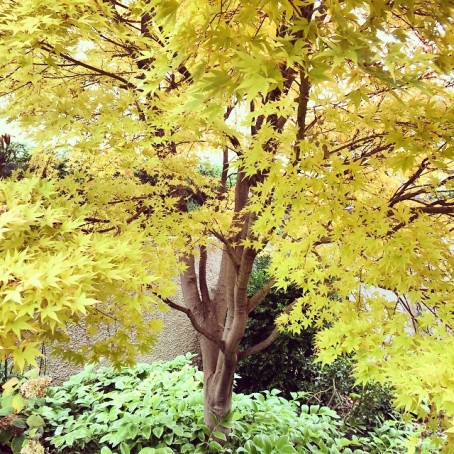Archive for November 19, 2014
Preparing Your Trees for Winter

Japanese coral bark maple (Acer ) in the Mary Livingston Ripley Garden, next to the Smithsonian Arts & Industries Building.
As we gaze around at the beautiful autumn colors that our trees are showing us, we’re trying not to think about the arrival of the cold and snowy weather of winter. However, arrive it will, and now is the time to prepare your trees for those coming winter months. Although all trees are potentially susceptible to winter injury, young and/or thin-barked, and broadleaf evergreen trees require the most preparation.
Excessively cold temperatures, wind, and quick temperature changes can cause drying, browning, and death of evergreen foliage. This problem is most prevalent on broadleaf evergreens such as rhododendrons, laurels, boxwoods, and hollies. To help prevent this damage, construct a barrier of heavy burlap, like a fence, to block drying winds from their prevailing direction. If the entirety of the plant is exposed, loosely wrap it in burlap. In either case, be sure to leave the top of the plant exposed so light and air penetration can still occur. In addition, it is important to keep watering your trees up until the time of the first hard frost. A 4-6 inch layer of mulch over the root zone will also help the soil retain warmth and moisture. (Remember not to pile the mulch up against the trunk of the tree.)

The boxwoods in the Kean Hall Garden in Livingston, New Jersey wrapped up in burlap for the winter, 1955. Smithsonian Institution, Archives of American Gardens, Garden Club of American Collection.
Another issue of concern, which is also caused by rapidly fluctuating temperatures, is sunscald. This occurs when the sun has warmed the trunk of the tree, and then that trunk is rapidly cooled upon sudden shading from a cloud, etc. This condition results in elongated, dried and cracked areas of dead bark. This can be prevented by wrapping the trunk with commercial tree wrap (available at most home and garden centers) or other light-colored material. This will reflect sunlight and keep the bark at a more consistent temperature. The wrap should be placed on the tree in the fall and removed in the spring, after the last frost.
Broadleaf evergreen foliage damage and frost cracks are influenced by many factors, including plant species, location, drainage, natural protection, and how well established a plant is in the landscape. There is no specific temperature at which damage occurs, but if the forecast calls for temperatures below the average seasonal low (29-33°F for Washington, D.C.), it is best to utilize the protection methods outlined above.
Tree branches can be prone to breakage from heaving snow and ice loads and by strong winds. Weakly attached, overextended and broken limbs should be pruned. Trees with an upright form, such as juniper, arborvitae, and clump birch, can be wrapped in burlap, or held together by wrapping the branches collectively with twine or rope. Any wrapping material should be removed in the spring.
When natural food sources grow scarce in the winter, rodents may feed on the young bark and cambial tissue of trees. Plastic tree guards or a cylinder of ¼” wire mesh placed around the trunks of young trees will help prevent this damage. Be sure to remove these guards once the spring has come so the tree does not wind up growing into them.
Trees possess an extraordinary ability to withstand severe winter weather, with some being more hearty than others. However, with proper care and attention, your trees should come through the winter ready to show off their new flowers and foliage for spring.
-Greg Huse, Smithsonian Gardens Arborist & Tree Collection Manager
November 19, 2014 at 7:27 am smithsoniangardens Leave a comment
